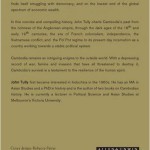ប្រាងប្រាសាទខ្មែរនិងរបបវាលពិឃាដ ទឹកទន្លេស័ក្តិសិទ្ធនិងព្រៃឈេីដេីរលុយមិនរួច អតីតកាលដែលពោរពេញទៅដោយភាពមហស្ចារ្យនិងភាពអម៉ាស….ប្រទេសកម្ពុជាគឺដែនដីនៃទឡ្ហីកម្ម។ សហស្សវត្សន៍កន្លងផុតទៅ ទីនេះគឺជាមហាអាណាចក្ររីកចំរេីនខ្ពស់ត្រដែតប្រកបដោយអំណាច ស្ថាបនាទីធ្លាប្រាសាទដ៏ធំស្កឹមស្កៃ។ សព្វថ្ងៃនេះ មួយពាន់ឆ្នាំកន្លងមក ត្រូវបានបំផ្លិចបំផ្លាញដោយជំលោះនិងសង្គ្រាមមហាវិនាសកម្ម ប្រទេសខ្មែរកំពុងតស៑ូក្រាញននៀលដេីម្បីប្រជាធិបតេយ្យ ហេីយស្ថិតក្នុងតំបន់ទាបបំផុតនៃចរន្តសេដ្ឋកិច្ចពិភពលោក។ កម្ពុជានៅជាប្រស្នាសំងាត់គួរអោយចាប់អារម្មណ៍សំរាប់ពិភពខាងក្រៅ។ ជាមួយនឹងទំព័រប្រវត្តិសាស្រ្តគួរអោយរន្ធត់នៃសង្គ្រាម ភាពអត់ឃ្លាន និងអំពេីឈ្លានពានបរទេសដែលបានគំរាមទៅរកមរណៈភាព ភាពបន្តដង្ហេីមរស់របស់កម្ពជាគឺជាសក្ខីភាពរបស់មនុស្សជាតិក្នុងការប្រឹងរស់អោយខាងតែបាន។ ដោយចន ធូលី ៚ បកប្រែដោយសេង សុភ័ណ
 Temples and killing fields, mighty rivers and impenetrable forests, a past filled with glory and decline…Cambodia is a land of contrasts. A millennium ago it was an empire at the height of its power, building the vast temple complexes of Angkor. Now, a thousand years later, ravaged by conflict and a genocidal civil war, Cambodia finds itself struggling with democracy, and on the lowest end of the global spectrum of economic wealth.
Temples and killing fields, mighty rivers and impenetrable forests, a past filled with glory and decline…Cambodia is a land of contrasts. A millennium ago it was an empire at the height of its power, building the vast temple complexes of Angkor. Now, a thousand years later, ravaged by conflict and a genocidal civil war, Cambodia finds itself struggling with democracy, and on the lowest end of the global spectrum of economic wealth.
Cambodia remains an intriguing enigma to the outside world. With a depressing record of war, famine and invasion that have all threatened to destroy it, Cambodia’s survival is a testament to the resilience of the human spirit.
By John Tully (2005) in his book “A Short History of Cambodia: from Empire to Survival”.
